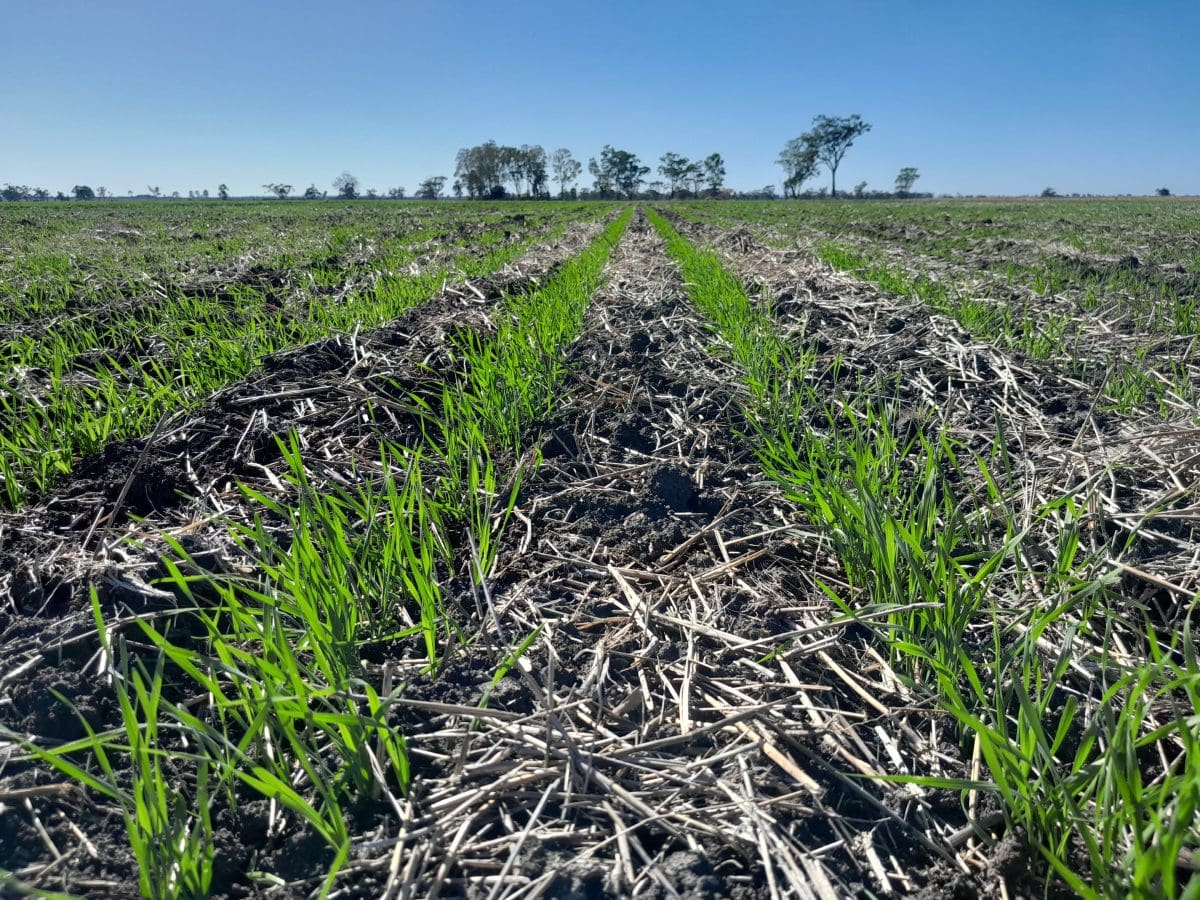
This early sown crop of Sunmax wheat is off to a flying start in the Moree region of NSW. Photo: Oscar Pearse
PRICES for low-protein wheat have dropped by up to $13 per tonne this week as exporters show preference for higher-spec grain.
Feedlots in the northern market are continuing to bid up for barley to drag it from as far south as central New South Wales.
Barley is also buying reasonable domestic demand in the south at more than $25/t under SFW wheat, compared to the north, where it is trading at a $30/t premium.
Selling from growers is minimal as planting advances at pace, with some southern farms now more than half planted in good to ideal conditions.
| Today | May 4 | |
| Barley Downs | $435 | $430 |
| SFW wheat Downs | $405 | $412 |
| Sorghum Downs | $380 | $405 |
| Barley Melbourne | $357 | $360 |
| ASW Melbourne | $392 | $405 |
| SFW Melbourne | $385 | $395 |
Table 1: Indicative prices in Australian dollars per tonne.
North hunts for barley
Barley remains in solid demand, and is trading at well over export parity as feedlots scramble to secure dwindling stocks close to the Queensland border, or transport loads by road from central NSW.
Wheat softening each week.
“Barley is holding up because of the drawing arc, and that lack of supply in northern areas is causing the market to stay firm,” Smithfield Cattle Company commodity buyer Brett Carsburg said.
In contrast, the wheat market continues to soften, with the bid side falling faster than the market to reflect buyers’ ideas about global pricing.
“It feels to me that wheat will soften each week, maybe only by $2 a week, but barley will continue to be stable.”
“You’ll see that barley-wheat spread widen.”
A number of feedlots are switching to wheat from barley as their staple grain because of the price difference, but lower numbers on feed in recent months at some sites means some stocks still need to be chewed through.
“On that switch to wheat from barley, there’s a bit of lag time, and it won’t happen until June-July at some places.”
Mr Carsburg said road transport is readily available for local work, but distance is an issue amid shorter hops being available carting cotton modules and sorghum.
“Companies don’t want to send trucks too far away when there’s local work.”
Mr Carsburg said the widespread labour shortage was also limiting road-transport options, and seeing an increase in on-farm selling.
“Most farmers with their own trucks haven’t got skilled drivers to drive them.
“If you’ve got a shortage of labour, you’re not going to put someone in a truck when they could be harvesting a crop or planting a crop.
“That means they’re selling on farm instead of delivered.”
Cottonseed firms
Cottonseed values have firmed this week.
In northern NSW and southern Qld, a $15/t premium for May over June forward has developed as the moment due to the slow gin start-up and pre-existing export commitments that need to be met.
“US cottonseed is still cheaper than Australian seed on a CFR basis by about US$20-30/t still,” Woodside Commodities managing director Hamish Steele-Park said.
“While China’s export demand is putting a floor in the Australian market, export parity is under current domestic values at the moment.”
Up-country, cottonseed for June forward ex gin is trading ex Moree-Mungindi gin $385-$390/t for June forward, with the Namoi Valley at $15/t less, and southern Qld $375/t.
South shut for sowing
Growers across the Australia grainbelt are progressing at pace with the sowing of winter crops, although some areas have pulled up as they wait for top-up rain.
The result is grower selling of current crop has virtually stopped.
“It’s very quiet; growers are on their tractors, and there’s next to no liquidity,” one trader said.
“There’s a bit of liquidity on new crop, and growers are starting to lock a little bit in now that they’ve got a start on planting.”
New-crop ASW wheat is trading delivered Melbourne at $400/t, $8/t above the prompt market.
With the canola price outlook softening, growers are believed to be planting more barley than they did last year, particularly with hopes that China will return to the market by next year.
“The cost of putting canola in will probably see the area of barley go up for the first time in a while.”
Faba beans are in thin demand, and trading at around $480/t delivered Melbourne based on domestic buying only.
Grain Central: Get our free news straight to your inbox – Click here

HAVE YOUR SAY